|






Click the flag
Meet our special
U.S. Publishers
|
ASD in the Classroom: Social Communication/Social Support
Back
to ASD in the Classroom Booklists
Back
to Autism Spectrum Disorders Index
Featured
Books in this Category / Main
Booklist

Featured
Books
|
|
The Autism Ambassadors Handbook: Peer
Support for Learning, Growth, and Success. Zak
Kukoff, $48.75
Every day, thousands of students with autism spectrum disorders
(ASD) struggle to stay afloat at school — sometimes bullied, often ostracized.
Mastering academics can be hard enough without the added challenge of
navigating social situations that neurotypical kids take for granted. If
students with ASD had a peer to model and reinforce socially appropriate
behavior and coach them through schoolwork, it could help them feel at home in
the student population.
This inspirational new book describes how to set up just such a
peer-mentoring organization in your school or community. With a clear
understanding of the needs of students with ASD and the kids who will be their
guides, Kukoff provides:
- Steps for organizing and implementing your own Autism Ambassadors
program
- Clear-cut guidelines on the responsibilities of student
“ambassadors,” plus peer-support strategies to improve the ambassador
experience
- More than a hundred specific interventions any student can employ
with students with ASD
- A path for students with ASD to become Autism Ambassadors
themselves
|
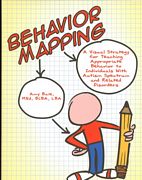
|
Behavior Mapping. Amy Buie, $31.95
A visual strategy for teaching
appropriate behavior to individuals with autism spectrum and related disorders. |
|
Body Talk: Teaching Students with
Disabilities about Body Language. Pat Crissey,
$35.95
A special educator's tried-and-true
strategies for teaching nonverbal communication to children with autism and
other developmental disabilities. More than 100 activities break down elements
of body language into teachable components. Through role playing, games, art
activities, watching video clips, and using worksheets, quizzes, and charts,
she shows busy educators, speech-language pathologists, and parents how to
teach body language.
Choose from a range of scenarios to
demonstrate to students such subtleties as knowing when a conversation is
ending, what excitement looks like, or how to acknowledge someone with raised
eyebrows. The companion CD-ROM includes many of the activities to print out for
use in the classroom or for practice at home. |
Back to top
|
|
The Conversation Train: a Visual Approach to
Conversation for Children on the Autism Spectrum. Joel Shaul, $29.95
This inventive color picture book uses the metaphor of a
train to teach basic conventions of conversation to children with autism
spectrum disorders (ASDs). Locomotives are like greetings; they get the train
going. Train cars are like different speakers' turns; it is good to have at
least a few when you are in conversation. A switch track is like a tactful
change in the topic of conversation. When a conversation veers off-topic it is
like a derailed train.
As well as attractive color photographs of trains, the
book contains engaging photocopiable worksheets and coloring pages to help
promote skill generalization. This highly visual approach to conversation is ideally
suited to children with ASDs aged approximately 5-13. |
|
Developing Motor and Social Skills: Activities for
Children with Autism Spectrum Disorder. Chris Denning, $37.95
This book focuses on motor and social skills development
for young children with autism spectrum disorder and is geared toward special
education teachers, general education teachers, and related personnel. This
book will outline what we now know about how physical activity impacts children
with Autism and how classroom teachers can use physical activity programs in
their classrooms. |
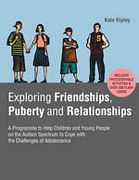
|
Exploring Friendships, Puberty and Relationships: a
Programme to Help Children and Young People on the Autism Spectrum to Cope with
the Challenges of Adolescence. Kate Ripley, $49.95
This evidence-based programme is designed to help young
people on the autism spectrum to cope with the many challenges of adolescence.
It encourages them to explore their identity, develop their friendships and to
begin to think more about adult relationships, tackling the important related
issues of puberty, sexuality, gender identity, body image, dress codes,
self-care, safety and conventions for touching along the way. Designed to be
used either as a 30-consecutive-session programme or to be dipped into as
particular issues arise, it contains engaging lesson plans, supplementary
activities, take-home tasks, group discussion points and over 200
cut-out-and-use flash cards.
This is a vital teaching resource for educators,
educational psychologists and other professionals working with children aged
11+ with ASDs. |
Back to top
|
|
First Steps to Social Success: Teaching Children
Critical Social Skills, Grades K-6. Diane Senn, $57.95
It is critically important that children learn
fundamental social skills during their elementary school years. This book and
CD provides a unique set of lessons for helping children learn skills and
insights they need for creating and maintaining positive relationships with
others. Direct teaching and reinforcement of these lessons helps provide
children with information and practice that will help bolster their positive
social-emotional development. This resource is targeted toward elementary
school ages. However, the basic information provided can be used for younger
and older students too. Featured topics include Knowing Myself First,
Initiating with Others, Learning Conversation Skills, and Reading Social Cues.
- 25 Lesson Plans with Reproducible Handouts
- Pre and Post Social Skills Assessment
- Graphic Cue Cards (summarizing each lesson)
- CD with Digital Interactive Activities and Printable Handouts
|
|
I Get It! Building Social
Thinking and Reading Comprehension through Book Chats. Audra
Jensen, $36.95
Reading is more that being able to
decode words and sentences. True understanding depends on social thinking
ability as well as language comprehension. Audra Jensen illustrates the
relationship between social thinking and reading comprehension and offers a
positive, practical approach to helping children learn to read for meaning. |
|
Improving Social Behaviors
in the Classroom: An Easy Curriculum for Teachers of Young Children
with Autism, Developmental Disabilities and Typical Children. Stephanny Freeman, Gazi Begum, Kristen Hayashida & Tanya
Papartlla, $47.95
When it comes to
teaching social skills to young learners, instructors are always looking for a
defined curriculum that presents the precise skills to address and how to teach
them. This book offers a curriculum that provides detailed day-by-day lessons to
be incorporated into the regular school day. The intent is to provide teachers
with a developmentally appropriate sequence of basic social skills by breaking
each skill into its component parts. Each skill is introduced and then built
upon throughout the weeks. This is a highly structured, sequenced curriculum
that enhances specific social goals that are the stepping stones of building
appropriate social behaviors.
The curriculum is designed for preschool or early elementary special education
teachers of students with autism spectrum disorders but can also be used with
any students who have developmental or emotional difficulties. |
Back to top
|
Inclusion and Autism Spectrum Disorder: Proactive
Strategies to Support Students. Christopher Denning & Amelia Moody,
$48.90
Inclusion and Autism Spectrum Disorder demonstrates
specific user-friendly and evidence-based strategies that classroom teachers
can implement to proactively set up and deliver classroom instruction that will
maximize the chances of success for students with autism spectrum disorder
(ASD). Teachers in inclusive environments are facing increasing pressure to
meet the needs of diverse classrooms that include more students with ASD. This
easy-to-use, research-based professional guide provides teachers with the
activities and specific strategies they need, along with detailed descriptions
that support immediate implementation. |
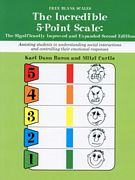
|
The Incredible 5-Point Scale, 2nd
Edition: Assisting Students with Autism Spectrum Disorders in Understanding
Social Interactions and Controlling Their Emotional Responses. Kari Dunn Buron & Mitzi Curtis, $27.50
The second edition of the wildly
popular INCREDIBLE 5-POINT SCALE is significantly improved and
expanded. Using the same practical and user-friendly format as the first
edition, readers benefit from work done with the scales over the past 10 years,
resulting in refinements to the original scales, now considered
"classics" in homes and classrooms across the country and abroad. As
well there are lots of new scales specifically designed for young children and
for those with more classic presentations of autism, including expanded use of
the Anxiety Curve. Another welcome addition is a list of goals and objectives
related to incorporating scales in students' IEPs. As in their other writings,
the authors emphasize the importance of self-management and self-regulation,
two evidence-based practices.
Purchasing the book allows online access
to blank scales, small portable scales and worksheets for easy duplication. |
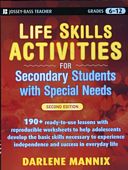
|
Life Skills
Activities for Secondary Students with Special Needs. Darlene
Mannix, $39.95
190+ ready-to-use lessons with reproducible
worksheets to help adolescents develop the basic skills necessary
to experience independence and success in everyday life.
The book provides 22 complete teaching units
focusing on basic life skills such as handling money, succeeding at
school, using the Internet safely, getting and keeping a job, and much
more. The book also contains 90 reproducible worksheets for teaching
students how to apply these life skills to real-life situations.
Life Skills Activities for Special Children.
Darlene Mannix, $39.95
Over 150 ready-to-use reproducible worksheets
to help children develop the basic skills necessary to experience independence
and success in everyday life.
Each of the book's activities focuses on
specific skills within the context of real-life situations and includes
complete teacher instructions for effective use, from objective and
introduction through optional extension activities and methods to assess
student learning. The book includes numerous reproducible parent letters
which can be sent home to help parents reinforce these lessons while
children are away from school. |
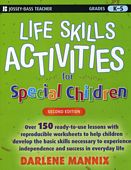
|
Back to top
|
New Social Story Book, Revised and Expanded 15th
Anniversary Edition. Carol Gray, $52.95 (includes CD-ROM)
Since the early 90s, Carol Gray’s world-famous Social
Stories have helped thousands of children with autism spectrum disorders.
This 15th Anniversary Edition of her best-selling book offers ready-to-use
stories that parents and educators have depended on for years, and new
sections added are: How to most effectively use and apply the stories; How
to improve the lives of younger children; and Social Stories for teens and
adults with autism. Developed through years of experience, these
strategically written stories explain social situations in ways children
and adults with autism understand, while teaching social skills needed for them
to be successful at home, school, work, and in the community. |
|
|
Next Steps to Social Success: Teaching Children More
Advanced Skills to Help Them Deal with Social Challenges, Grades K-6. Diane
Senn & Kathy McElvenny, $57.95
This companion resource builds upon the critical social
skills taught in First Steps to Social Success and provides skill
information for continuing, enhancing and dealing with challenges for social
success. Featured Topics include Building Friendships, Managing Friendships,
Handling Friendship Problems, and Social Skills in the Classroom.
- 25 Lesson Plans with Reproducible Handouts
- Pre and Post Social Skills Assessment
- Graphic Cue Cards (summarizing each lesson)
- CD with Digital Interactive Activities and Printable Handouts
|
|
|
The PEERS Curriculum for School-Based
Professionals: Social Skills Training for Adolescents with Autism Spectrum
Disorders. Elizabeth Laugeson, $83.90
The PEERS® Curriculum for School-Based
Professionals brings UCLA's highly acclaimed and widely popular PEERS
program into the school setting. This sixteen-week program, clinically proven
to significantly improve social skills and social interactions among teens with
autism spectrum disorder, is now customized for the needs of psychologists,
counselors, speech pathologists, administrators, and teachers. The manual is
broken down into clearly divided lesson plans, each of which have concrete
rules and steps, corresponding homework assignments, plans for review, and
unique, fun activities to ensure that teens are comfortable incorporating what
they've learned. The curriculum also includes parent handouts, tips for
preparing for each lesson, strategies for overcoming potential pitfalls, and
the research underlying this transformative program. |
Back to top
|
Play and
Friendship in Inclusive Autism Education: Supporting Learning and Development. Carmel
Conn, $60.95
Taking an innovative approach to autism and play, this
practical text focuses on the particular form play and friendship takes for
children with autism and their peers. Autistic children have clear preferences
for play, with sensory-perceptual experience remaining a strong feature as they
develop. Play and Friendship in Inclusive
Autism Education offers a framework for supporting children’s development
through play, with step-by-step guidance on how to facilitate the playful
engagement of children with autism. |
|
QUEST Program 1: Social Skills Curriculum for
Elementary School Students with Autism. JoEllen Cumpata &
Susan Fell, $34.50
The QUEST Program 1 was developed to address the needs of
elementary students with social skills and pragmatic language weaknesses.
Because these children benefit from regular instruction and practice, the
program uses an intensive proactive approach to teach social skills by
combining written instruction with games, experiential stories, and role play,
which results in discussion, friendly feedback from peers, and real world
experience. Even when provided with an inclusive education in a general
education setting, these students do not typically interpret social cues,
nuances and rules of interaction in the same way as their peers, which is the
reason the program maximizes generalization of skills both in and outside the
classroom. The goals of the program are to help students gain a better
understanding of human behavior and interaction and to provide opportunities to
become familiar and comfortable with the social skills and pragmatic language
necessary to be successful at school and in the community.
QUEST Program 2: Social Skills Curriculum for
Elementary School Students with Autism. JoEllen Cumpata &
Susan Fell, $34.50
Why start a social skills program? The question is not
why, but why not? With inclusive education becoming the norm in schools
nationwide, teachers often struggle to address students non-academic needs,
but teachers need ready-to-use lessons that won't interfere with their
curriculum. Quest Program 2 is a social skills program created to help
middle school students with autism who struggle with social skills and
pragmatic language.
Developed by a school social worker and speech language
pathologist, the program uses an intensive, proactive approach to teaching
social skills, combining written instruction with games, activities, and
student interaction. Six helpful units: School Survival Basics,
Understanding and Managing Emotions, Communication Skills, Making Friends
and Interacting with Peers, Personal Safety, Vocational Readiness can be
implemented either chronologically or on their own. |
|
Back to top
|
Social Behavior
Mapping — Connecting Behavior, Emotions and Consequences Across
the Day. Michelle Garcia Winner, Editor, $34.95
One of the most successful tools used
at Michelle G. Winner's Center for Social Thinking is the Social
Behavior Map (SBM). Michelle developed the SBM as a cognitive behavior
strategy to teach individuals about the specific relationship between
behaviors, other's perspective, other's actions (consequences),
and the student's own emotions about those around him or her. The
SBM is a visual tool that displays these abstract concepts through
a flow chart.
Now, Michelle and her team of talented
therapists have created a collection of over 50 Social Behavior
Maps covering a range of topics for home, community and the classroom.
Social Behavior Mapping is geared for use by parents and
professionals to help those with social thinking challenges understand
what behaviors are expected and unexpected in a way that makes sense
to their way of thinking. |
|
|
The Social Compass Curriculum:
a Story-Based Intervention Package for Students with Autism Spectrum
Disorders. LouAnne Boyd, Christina McReynolds, Karen Chanin,
$65.95
Children with autism learn social skills
best in group settings where they can practice every day interactions with
peers. Ideal for Grades 4-8 but easily adaptable for use with older children,
this social skills intervention curriculum gives educators 24 lessons that help
students with autism make progress in areas critical to social success. Each
step-by-step lesson gives students a social story that models a key skill;
worksheets that reinforce takeaway points; a simple, memorable icon that helps
them remember what to do; opportunities to role-play and rehearse the skill;
and take-home worksheets to ensure generalization in settings outside of
school. |
|
Social Rules for Kids: the Top 100 Social Rules Kids
Need to Succeed. Susan Diamond, $27.50 (ages 7-14)
Many parents are not sure of what to say and do to help
their children improve their social interactions. Social Rules for Kids helps open the door of communication between parent and child by addressing 100
social rules for home, school, and the community. Using simple, easy-to-follow
rules covering topics such as body language, manners, feelings and more, this
book aims to make students' lives easier and more successful by outlining
specific ways to interact with others on a daily basis. |
Back to top
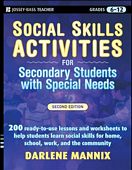
|
Social Skills Activities
for Secondary Students with Special Needs, Grades 6-12, 2nd Edition. Darlene
Mannix, $35.95
200 ready-to-use lessons and worksheets to help students learn
social skills for home, school, work and the community.
The updated new edition of this valuable
resource offers an exciting collection of worksheets to help
adolescents build the social skills they need to interact effectively
with others and learn how to apply these skills to various real-life
settings, situations, and problems. The book provides complete
teaching units focusing on 20 basic social skills, such as being
a good listener, "reading" other
people, and using common sense.
Social Skills Activities for Special Children,
Grades K-5, 2nd Edition. Darlene Mannix, $39.95
Over 160 ready-to-use lessons and worksheets to help children
use social skills inside and outside the classroom.
Each lesson places a specific skill within the context of real-life
situations, giving teachers a means to guide students to think
about why the social skill is important. The hands-on activity
that accompanies each lesson helps students to work through, think
about, discuss, and practice the skill in or outside of the classroom. |
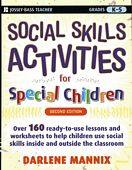
|
|
Social Skills and Adaptive
Behavior in Learners with Autism Spectrum Disorders. Peter Gerhardt
& Daniel Crimmins, $46.50
Promoting better social skills and
behavior are priorities for anyone working with learners with autism. This accessible
book is an ideal text for professionals and essential reading for
administrators and consultants in educational settings. Readers will explore
current evidence, best-practice recommendations, and future research directions
for:
- assessing social skills with evidence-based
methods and tools
- conducting interventions that really make a
difference
- promoting friendships and peer acceptance
- implementing school-wide positive behavior
support
- improving outcomes with Pivotal Response
Treatment
- strengthening children's self-help skills
- providing effective support for families of
children with autism
- using appropriate pharmacologic interventions to
manage symptoms associated with ASD
A cornerstone resource for current and
future professionals working with learners of all ages, this book will help
readers understand what really advances the social skills and behavior of
students with autism — so they can use effective practices to improve the lives
of children and families. |
Back to top
|
|
Social Skills Games & Activities
for Kids with Autism. Wendy Ashcroft, Angela
Delloso & Anne Marie Quinn, $33.95
SOCIAL SKILLS GAMES AND ACTIVITIES FOR
KIDS WITH AUTISM provides complete instructions for using fun, engaging
games and activities to teach social skills to children with autism spectrum
disorders. The games include directions for assessing skills such as asking for
toys, getting the attention of others, reading nonverbal gestures,
understanding perspectives, and cooperating to solve problems. Using the
principles of Applied Behavior Analysis, the book takes teachers through
motivating, prompting, shaping, modeling, and reinforcing social skills while
playing the games and helping students learn to participate in other activities
such as demonstrating the social skill in role plays and the natural
environment. Perfect for teachers struggling to help their students with autism
learn to interact socially with their peers, these games are sure to become a
much-loved part of students’ daily routines. |
|
|
Social Skills Matter! Betty Ashbaker & Jill
Morgan, $53.95 (grades PK-2)
Help your students learn how to communicate effectively,
make good choices, and practice appropriate behavior with Social Skills
Matter! This book includes over 80 reproducible mini-books for children to
assemble, color, read, and make their own. Each mini-book focuses on a
different facet of important social skills including cooperative play, learning
about feelings, communication, school-day behavior, manners, and behavior
management. Mastery of these essential social skills can be a factor in
determining a child’s future success, social acceptance, and happiness.
Features:
- Developmental tasks for communication, emotions, manners, relationships,
and daily living skills
- Multisensory activities that shape behavior through auditory,
visual, and tactile senses
|
|
|
The Social Skills Picture
Book: Teaching Play, Emotion, and Communication to Children with
Autism. Jed Baker, $51.95
Using photographs with speech balloons,
and "social stories" style prompts, Jed Baker has created
a "…dynamic teaching tool that engages the attention and motivation
of students who need a little extra help learning appropriate social
skills…" Part one includes discussion of the importance of
visual supports, an overview of social skills teaching methods…discrete
trial, incidental teaching, cognitive picture rehearsal, social
stories, structured learning…and instructions on creating your own
social skills picture stories. Part two is subdivided into communication-related
skills, play-related skills and emotion-related skills. Over 200
pages. |
Back to top
|
The Social Skills
Picture Book for High School and Beyond. Jed Baker, $54.95
The Social Skills Picture Book for
High School and Beyond offers parents and educators of teens
(and young adults) photos of actual students engaging in a variety
of social situations. This visual learning format shows, rather
than tells, students the right (and wrong) ways to interact in different
circumstances. The photos illustrate the positive and the negative
consequences of social interactions in a wide variety of real-life
situations that are important to teens. |
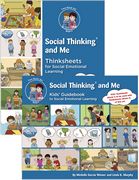
|
Social Thinking and Me: Thinksheets and Guidebook. Michelle Garcia Winner & Linda Murphy, $86.95* (2
volume set); Also available: Social Thinking and Me: Kids' Guidebook to Social Emotional Learning. Michelle Garcia Winner & Linda Murphy, $42.95* (Guidebook only) *a 10% discount applies to all professional-use purchases
of Social Thinking publications.
Whether you’re new to Social Thinking or a veteran in
using their materials, Social Thinking and Me is the perfect tool to
introduce and teach core Social Thinking Vocabulary and concepts to older
elementary school and middle school-age kids (ages 9-14). This two-book set
breaks larger and more complicated social concepts down into smaller chunks to
make it easier for adults to teach and easier for kids to learn.
- No prior knowledge of Social Thinking or teaching our methodology
is needed! Can be used by teachers in mainstream or inclusion classrooms, by
therapists in individual or small group settings, and by parents as a
teaching/learning tool to help kids with social learning.
- Social Thinking and Me uses language that is
understandable to both kids and adults, and breaks down complex topics in a way
that is clear and manageable to both new and familiar learners of Social
Thinking. Its voice is guiding, kid friendly, and sometimes humorous
|
|
Social Thinking THINKSHEETS for Tweens and Teens:
Learning to Read in Between the Social Lines. Michelle Garcia Winner,
$48.95
Social Thinking Worksheets for Tweens and Teens,
has a new name: Social Thinking Thinksheets for Tweens and Teens.
It’s the same great content, now with a new title and cover.
Thinksheets for Tweens and Teens focuses on
the social issues and challenges faced by pre-adolescents and adolescents and
introduces social concepts and strategies that can help individuals navigate
these tricky years. Social rules and expectations change with age; thinking and
behavior that was appropriate in elementary school can quickly become
inappropriate and unexpected as students move into middle and high school. Thinksheets
help educators, therapists, and parents encourage more mature social thinking
and related shifts in their students’ social skills. The thinksheets explore a
wide range of topics, starting with the basic Social Thinking understanding of
the Four Steps of Communication, to exploring the hidden rules of the
classroom. Thinksheets books are easily used by parents,
paraprofessionals, or professionals. Thinksheets are designed to help guide the
thinking of both the teacher and the student in working together to better
understand social issues and social challenges. |
Back to top
|
|
Successful Social Stories™ for School and College Students
with Autism: Growing Up with Social Stories™. Siobhan Timmins, $31.95
As children grow up and spend more and more time away
from home in schools and colleges, life often seems to get increasingly
complicated. Autism makes the challenges they meet in these new environments
even more difficult to navigate. Social Stories™ is a highly regarded strategy
that parents and teachers can use to help young people with autism understand
the new social situations they face during this time. Writing an effective
Story takes a special set of skills, and in this fully illustrated book Dr
Siobhan Timmins explains how to acquire and hone these techniques and put them
into practice.
Following on from her book on writing Social Stories™ for
young children, this book on the next age group up includes 160 illustrations
and clear examples based on the author's own experiences of raising a son with
autism. She explains how to identify the underlying issues, and articulate the
key ideas so that young learners can find connections between Stories to build
a greater understanding of relationships, the adult world and their own
identity. The book is an invaluable guide to creating bridges between young
people and the parts of life they find most difficult. |
|
|
Successful Social Stories™ for Young Children: Growing Up with Social Stories™. Siobhan Timmins, $28.95
Social Stories™ are
acknowledged as a very successful way of teaching concepts and social
understanding to children with autism spectrum disorders, but considerable
skill is needed to write the most effective story. This clear and engaging book
introduces ways of thinking about the issues your child finds difficult, and
includes 32 stories created by Dr Siobhan Timmins for her son during his early
years, with helpful explanations of how she did it, and what the underlying
thinking was behind each set of stories.
She explains how the stories build upon each other to
help the child to understand further, more complex topics, and how to see the
connections so that you can best help your child. From basic skills such as
learning to listen, wait and share, to common fears, this book takes the
mystery out of creating effective Social Stories™ and amply demonstrates how to put together a cohesive set of stories which your
child can understand and relate to. |
|
Supporting Social Inclusion for Students with Autism
Spectrum Disorders: Insights from Research and Practice. Cathy Little,
Editor, $79.90
Drawing together contributions from experts at the
forefront of research in the field, Supporting Social Inclusion for Students
with Autism Spectrum Disorders demonstrates that social inclusion is a
defining feature of successful education of students with a spectrum disorder.
Divided into three parts, this book begins by proposing a
contemporary and operational definition of social inclusion that will help
facilitate active engagement by all stakeholders involved in supporting social
inclusion within educational settings. The relationship between well-developed
social skills and positive social outcomes is also explored, and subsequent
chapters explicate and contextualize social inclusion across a range of
educational settings. The final chapters present case studies and viewpoints
from stakeholders central to the successful social inclusion of students with
the disorder. Through discussion of its findings, this book provides the reader
with a deep understanding of social inclusion and confirms its importance in
facilitating positive educational outcomes for students with Autism Spectrum
Disorder. |
Back to top
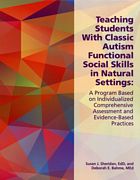
|
Teaching Students with Classic Autism
Functional Social Skills in Natural Settings. Susan
Sheridan & Deborah Bahme, $26.95
A program based on individualized
comprehensive assessment and evidence-based practices.
This highly practical book guides
teachers and other practitioners in developing and implementing comprehensive
social skills programs for individuals with classic autism. This program was
developed specifically for students with classic features of autism, who tend
to learn best by participating in activities they find interesting, engaging,
and part of their daily lives. As a result, the social skills are embedded in
motivating lessons in real-life social situations, involving such things as
learning to do something nice for others, working on a classroom project, or
waiting in a cafeteria line. To make this well-crafted functional social skills
curriculum even more relevant, it includes a comprehensive, yet easy-to-use
assessment tool tied to IEP development using evidence-based practices. |
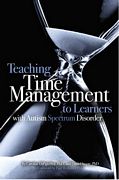
|
Teaching Time Management to Learners with Autism
Spectrum Disorder. Caroline DiPipi-Hoy & Daniel Steere, $31.50
An individual with ASD may quickly learn time-telling
skills; however, simply being able to tell time does not necessarily lead to
time-management skills. This practical book provides the tools necessary to
move beyond time identification, and teach learners how to use time in a way
that promotes independence.
Teaching Time Management to Learners with Autism
Spectrum Disorder presents ways to facilitate time-management skills for
learners across the lifespan, as a skill that can be developed from early childhood
through the adult years. |
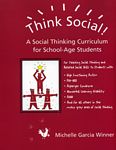
|
Think Social!
A Social Thinking Curriculum for School-Age Students. Michelle
Garcia Winner, $123.95
Think Social! A Social Thinking Curriculum for School-Age Students is a social thinking curriculum to guide therapists, educators and
parents who are exploring how to introduce social thinking to their
students in a structured and thought out progression. Think
Social is designed to assist children across the school ages
who have been diagnosed with Asperger syndrome, PDD-NOS, high-functioning
autism, AD/HD, hyperlexia, non-verbal learning disability (NVLD)
and when there is no clear diagnosis, but social challenges are
present. |
Back to top
|
Thinksheets for Teaching Social Thinking® and Related
Skills. Michelle Garcia Winner, $48.95 (formerly titled Worksheets!)
One of Social Thinking's best-selling books, Worksheets!, now has a new name: THINKSHEETS.
Same great content, now with a new title and cover. THINKSHEETS encourages
higher functioning individuals with autism spectrum disorder, social
(pragmatic) communication disorder, ADHD, or other related social–emotional
learning challenges to process more deeply what social thinking means to them.
The curriculum works best for students mid elementary through high school. The THINKSHEETS
are coded for different aged students.
Developed from years of working with students with
social–cognitive challenges, the THINKSHEETS serve as mini-lesson plans to
introduce Social Thinking concepts. Educators can then take these concepts and
adapt them through different activities they develop. Teachers, therapists,
parents, and other caregivers can also copy and send the material to other
stakeholders in the individual’s life to reinforce the concepts the student is
learning. |
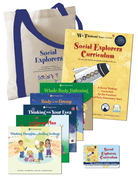
|
We Thinkers! Volume 1 Social Explorers. Ryan
Hendrix, Kari Zweber Palmer, Nancy Tarshis, Michelle Garcia Winner, $151.95* *a 10% discount applies to all professional-use purchases
of Social Thinking publications.
We Thinkers! Volume 1 Social Explorers is an
engaging Social Thinking educational series that combines a social learning
framework with music and dramatic play activities that will appeal to early
learners. Play is the learning environment of young children, and this
curriculum capitalizes on this idea! The We Thinkers! Volume 1 Social
Explorers Deluxe Set includes the five storybook set, curriculum
book, The Incredible Flexible You music CD, and a free tote bag.
Note: Due to some confusion caused by use of the word
"flexible" in the names of many of our products, The
Incredible Flexible You series name has changed to We
Thinkers! There will be no content change in Volume 1, only a name
change. As the components in Volume 1 are reprinted (Storybooks 1-5, curriculum
book, and tote bag), we will be updating them with the new We Thinkers! name.
In the interim, our Volume 1 Deluxe Package may contain products with the two
series' name on them. |
Back to top
|
|
We Thinkers! Volume 2 Social Problem Solvers: a Social
Thinking® Curriculum for the Preschool and Early Elementary Years.
Ryan Hendrix, Kari Zweber Palmer, Nancy Tarshis, Michelle Garcia Winner,
$223.95* *a 10% discount applies to all professional-use purchases
of Social Thinking publications.
Social executive functioning is a tall order for our
early learners, especially for kids with social emotional learning challenges. We
Thinkers! Volume 2: Social Problem Solvers delves deeper into the social
clues for sharing space, interacting with others, and regulating emotions.
Social executive functioning is used in the classroom when sitting in a group
to learn, it’s used when running onto the playground to play with others, and
kids use it to figure out how to join a play group that’s pretending to be
pirates. It involves surveying a social situation, understanding what the group
is doing, considering others’ ideas, having enough flexibility (in thoughts and
behavior) to ride out the shifts and changes that may occur, negotiating roles,
turns, or positions, and self-regulating to keep emotions, actions and
reactions under control when problems arise.
We Thinkers! breaks down these complex concepts
into smaller, teachable segments that kids can understand and presents them in
an organized curriculum from which adults can teach in a step-by-step manner.
Excellent teaching curriculum for all students in a mainstream setting and with
deeper lessons geared to students with social learning challenges.
- We Thinkers! curriculum
- Five paperback, full-color storybooks
- We Thinkers! GPS Book (Group Collaboration, Play and Problem
Solving)
- USB Drive containing core teaching materials from the curriculum
and the GPS book
- Tote bag
|
|
Why Teach Social Thinking?
Questioning Our Assumptions about What It Means to Learn Social Skills. Michelle Garcia Winner, $36.50
Today's children (both neurotypical and
those with social learning challenges) are entering school with declining
abilities to learn in a group, attend to a lesson, be considerate toward
others, or self-regulate their own behavior. Teachers are increasingly finding
themselves ill-equipped with the know-how, tools, and strategies to teach
students about social awareness, emotional intelligence, and self-regulation of
behavior.
If you've ever wanted, or needed, to
make a case for social instruction to be added to a student's treatment plan,
social goals written into a student's IEP, or social thinking lessons infused
into a classroom or campus curriculum plan, WHY TEACH SOCIAL THINKING drives
home the importance of social learning to a student's academic success and
later success in life. Through exploring 12 core questions, Winner attempts to
raise awareness of the many complex and interrelated issues that are at the
heart of teaching social skills. While we wait for public policy to catch up
with the ever-present and growing needs of our students, this book will open
doors to a new understanding for parents, teachers, service providers, and
administrators about effective ways to teach social thinking and related social
skills. |
Back to top
Complete
Booklist
The Autism Ambassadors Handbook: Peer
Support for Learning, Growth, and Success. Zak
Kukoff, $48.75
Behavior Mapping. Amy Buie, $31.95
Body Talk: Teaching Students with
Disabilities about Body Language. Pat Crissey,
$35.95
The Conversation Train: a Visual Approach to
Conversation for Children on the Autism Spectrum. Joel Shaul, $29.95
Developing Motor and Social Skills: Activities for
Children with Autism Spectrum Disorder. Chris Denning, $37.95
Exploring Friendships, Puberty and Relationships: a
Programme to Help Children and Young People on the Autism Spectrum to Cope with
the Challenges of Adolescence. Kate Ripley, $49.95
First Steps to Social Success: Teaching Children
Critical Social Skills, Grades K-6. Diane Senn, $57.95
I Get It! Building Social Thinking and Reading Comprehension
through Book Chats. Audra Jensen, $36.95
Improving Social Behaviors in the Classroom: an Easy Curriculum
for Teachers of Young Children with Autism, Developmental Disabilities
and Typical Children. Stephanny Freeman, Gazi Begum, Kristen Hayashida
& Tanya Papartlla, $47.95
Inclusion and Autism Spectrum Disorder: Proactive
Strategies to Support Students. Christopher Denning & Amelia Moody,
$48.90
Incorporating Social Goals in the Classroom: a Guide for Teachers
and Parents of Children with High-Functioning Autism and Asperger Syndrome.
Rebecca Moyes, $29.95
The Incredible 5-Point Scale, 2nd
Edition: Assisting Students with Autism Spectrum Disorders in Understanding
Social Interactions and Controlling Their Emotional Responses. Kari Dunn Buron & Mitzi Curtis, $27.50
Let's Talk Emotions: Helping Children with Social Cognitive
Deficits, Including AS, HFA, and NVLD, Learn to Understand and Express
Empathy and Emotions. Teresa Cardon, $34.50
Lifeskills Activities for Secondary Students. Darlene Mannix,
$39.95
Lifeskills Activities for
Special Children Grades K-5, 2nd Edition. Darlene Mannix, $39.95
New Social Story Book, Revised and Expanded 15th
Anniversary Edition. Carol Gray, $52.95 (includes CD-ROM)
Next Steps to Social Success: Teaching Children More
Advanced Skills to Help Them Deal with Social Challenges, Grades K-6. Diane
Senn & Kathy McElvenny, $57.95
The PEERS Curriculum for School-Based
Professionals: Social Skills Training for Adolescents with Autism Spectrum
Disorders. Elizabeth Laugeson, $83.90
Play and
Friendship in Inclusive Autism Education: Supporting Learning and Development. Carmel
Conn, $60.95
QUEST Program 1: Social Skills Curriculum for
Elementary School Students with Autism. JoEllen Cumpata &
Susan Fell, $34.50
QUEST Program 2: Social Skills Curriculum for
Elementary School Students with Autism. JoEllen Cumpata &
Susan Fell, $34.50
Social Behavior Mapping — Connecting Behavior, Emotions and
Consequences Across the Day. Michelle Garcia Winner, Editor, $34.95
The Social Compass Curriculum: a Story-Based Intervention
Package for Students with Autism Spectrum Disorders. LouAnne Boyd, Christina
McReynolds, Karen Chanin, $65.95
Social Rules for Kids: the Top 100 Social Rules Kids Need
to Succeed. Susan Diamond, $27.50 (ages 7-14)
Social Skills Activities for
Secondary Students. Darlene Mannix, $35.95
Social Skills Activities for Special Children, Grades K-5, 2nd
Edition. Darlene Mannix, $39.95
Social Skills and Adaptive Behavior in Learners with Autism Spectrum
Disorders. Peter Gerhardt & Daniel Crimmins, $46.50
Social Skills Games & Activities
for Kids with Autism. Wendy Ashcroft, Angela
Delloso & Anne Marie Quinn, $33.95
Social Skills Matter! Betty Ashbaker & Jill
Morgan, $53.95 (grades PK-2)
The Social Skills Picture Book: Teaching Play, Emotion
and Communication to Children with Autism. Jed Baker, $51.95
The Social Skills Picture Book for High School and Beyond.
Jed Baker, $54.95
Social Thinking and Me: Thinksheets and Guidebook. Michelle Garcia Winner & Linda Murphy, $86.95* (2
volume set) *a 10% discount applies to all professional-use purchases
of Social Thinking publications.
Social Thinking and Me: Kids' Guidebook to Social Emotional Learning. Michelle Garcia Winner & Linda Murphy, $42.95* (Guidebook only) *a 10% discount applies to all professional-use purchases
of Social Thinking publications.
Social Thinking THINKSHEETS for Tweens and Teens:
Learning to Read in Between the Social Lines. Michelle Garcia Winner,
$48.95
SOS Social Skills in Our Schools: a Social
Skills Program for Children with Pervasive Developmental Disorders, Including
High-Functioning Autism and Asperger Syndrome and Their Typical Peers. Michelle
Dunn, $41.95
Successful Social Stories™ for School and College Students
with Autism: Growing Up with Social Stories™. Siobhan Timmins, $31.95
Successful Social Stories™ for Young Children: Growing Up with Social Stories™. Siobhan Timmins, $28.95
Supporting Social Inclusion for Students with Autism
Spectrum Disorders: Insights from Research and Practice. Cathy Little,
Editor, $79.90
Teaching Students with Classic Autism
Functional Social Skills in Natural Settings. Susan
Sheridan & Deborah Bahme, $26.95
Teaching Time Management to Learners with Autism
Spectrum Disorder. Caroline DiPipi-Hoy & Daniel Steere, $31.50
Think Social! A Social Thinking Curriculum for School-Age
Students. Michelle Garcia Winner, $123.95
Thinksheets for Teaching Social Thinking® and Related
Skills. Michelle Garcia Winner, $49.50 (formerly titled Worksheets!)
We Thinkers! Volume 1 Social Explorers. Ryan
Hendrix, Kari Zweber Palmer, Nancy Tarshis, Michelle Garcia Winner, $151.95* *a 10% discount applies to all professional-use purchases
of Social Thinking publications.
We Thinkers! Volume 2 Social Problem Solvers: a Social
Thinking® Curriculum for the Preschool and Early Elementary Years.
Ryan Hendrix, Kari Zweber Palmer, Nancy Tarshis, Michelle Garcia Winner,
$223.95* *a 10% discount applies to all professional-use purchases
of Social Thinking publications.
Why Teach Social Thinking?
Questioning Our Assumptions about What It Means to Learn Social Skills. Michelle Garcia Winner, $36.50
Back to top
For related titles, see our booklists on:
Autism Social Thinking;
Asperger Syndrome AV Resources;
Autism Video & Audio;
Asperger Syndrome AV Resources;
Therapeutic Games;
Transition to Adulthood;
Bullying Resources for Educators;
Bullying Resources for Kids & Teens;
Autism Nonverbal Learning Disabilities

Didn't
find it...?
Not sure...?
Need a suggestion...?
There are over 10,000 titles listed on our website and more than 35,000 titles in our inventory. If you haven't found what you want on the website — and it's one of our specialties — chances are good that we carry it, or can get it for you. Just let us know what you're looking for.
Call us toll-free 1-800-209-9182
or e-mail
PARENTBOOKS
is pleased to invoice institutions. Please inquire regarding terms and
discounts. Shop in person, by phone, fax, mail or e-mail . VISA, Mastercard
and Interac are welcome. We are open from 10:30 to 6:00 Monday through Friday and from 11:00 to 5:00 on Saturday.
 All prices are in Canadian dollars
and are subject to change without notice. All prices are in Canadian dollars
and are subject to change without notice.

|